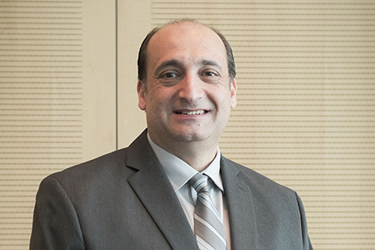A Q&A With DIA CEO Marwan Fathallah

“DIA serves as a unique global ‘connector’ of passionate students, professionals, organizations, and government working to expand healthcare outcomes worldwide. Our Global Annual Meeting will emphasize diverse perspectives, real-world accessibility, and patient experience. Patient input is the Holy Grail — various sessions at DIA 2023 will focus on these key topics to help us strategize the most successful pathways to the future of healthcare.”
Marwan Fathallah, DIA CEO
In anticipation of this year’s DIA 2023 Global Annual Meeting in Boston (June 25-29), Life Science Connect asked Marwan Fathallah, CEO of DIA, some questions about the event.
If you had to pinpoint one way/issue/aspect/etc. that DIA’s annual meeting will be different from years past, what would that be?
Since being founded in 1964, DIA has proudly maintained a transparent and neutral setting throughout our learning offerings and conference events worldwide. Holding firm to our founding principle of accountability and trust, these open-forum formats are especially crucial to the development and success of emerging health and life sciences innovations. To ensure multidisciplinary perspective and input, our program agenda for the DIA 2023 Global Annual Meeting is built collaboratively with attendees, patients, policymakers, and more, in addition to our Board of Directors, Advisory Councils, and Fellows.
This year’s agenda will address progress points and updates across ongoing drug and device lifecycles, as well as host enlightening dialogue in honor of our 2023 theme, Illuminate. Last year’s theme, the Future of Health, allowed us to highlight the possibility of tomorrow and the future we imagined as a community. At DIA 2023, we are illuminating the path forward and highlighting the steps needed to achieve the future we all aspire to see. Many interactive discussion-based sessions and roundtables offer opportunities to network and learn jointly.
There are 13 tracks at this year’s meeting. Is that the same as previous years? If not, what has changed?
DIA 2023 will host 13 industry-leading tracks, each featuring fresh sessions highlighting the latest developments and insights. Track 3, formerly known as Data and Technology in Clinical Trials, has been renamed to Data and Technology, and Track 6, formerly known as Preclinical Development and Early-Phase Clinical Development has been renamed to Translational Sciences and Precision Medicine.
What has the DIA planning committee learned from previous years regarding how the meeting is structured and run, and how have those learnings affected this year’s meeting?
Input from attendees is crucial to successful events, which is why you can visit the DIA booth to discuss concerns with DIA staff, network during brief Q&A, or even provide a testimonial. Each year, we finetune our event sessions and offerings based on industry professional needs. DIA gained feedback on the importance of professional development for our industry and has increased the number of sessions offered in this track (as our 2022 sessions were standing room only).
Additionally, we gained feedback on the overlap between our Statistics and Data and Technology in Clinical Trials tracks and have consequently updated the Data and Technology track to ensure the overlap was resolved. DIA, our Program Committee, and speakers, are also ensuring that sessions are interactive and engaging to encourage fruitful dialogue and discussion amongst our attendees.
The regulatory sessions and town halls have traditionally been some of the most attended. What can attendees expect this year from these particular sessions that will be different?
DIA’s Town Halls offer the opportunity for our attendees to gain regulatory intelligence of priorities, updates, and insights by regulators from around the world in a singular place.
Attendees have the option to attend the WHO Town Hall, the NMPA Town Hall, the FDA Office of Generic Drugs and the Office of Pharmaceutical Quality Town Hall, the ANVISA Town Hall, the Asia Town Hall that offers insights on regulatory convergence in Asia, the PMDA Town Hall, the Health Canada Town Hall, the FDA Rare Disease Town Hall, the FDA Town Hall, and the EMA-FDA Question Time session. The ANVISA Town Hall and the WHO Town Hall are new to DIA, and we are thrilled to gain insights from the WHO that will highlight the importance and impact of reliance and regulatory system strengthening along with insights from Brazil’s regulatory authority.
What regulatory topics that are slated for discussion do you expect will garner the most interest this year and why?
There are many options for our attendees to choose from relating to our regulatory tracks and topics. The following sessions are those that DIA thinks will garner the most interest from our attendees:
- The various Town Halls offered throughout our conference will provide global regulatory intelligence to our attendees looking to gain insights into the regulatory impact on their companies and organizations.
- Our Cell and Gene Therapies Pulse Check session will address the cell and gene therapy regulatory landscape and priorities of major countries/regions and discuss critical factors that may facilitate the development and availability of transformative therapies.
- The Disruptive Medicine Innovation: Combination Products session highlights the successful development of combination products and how their development will require great collaboration within the industry to overcome regulatory, clinical, and technical challenges.
- The International Collaboration for Pharmaceutical Quality and Manufacturing Agility session will provide a global perspective on international collaboration efforts and opportunities to facilitate agility for manufacturers, efforts to enable collaboration among regulators, and global submissions.
- The Regulatory Cooperation, Coordination, and Reliance in Times of Crisis: The ICMRA Role session analyzes the fundamental role ICMRA had during the pandemic in fostering regulatory cooperation and coordination globally, and the current work finalized at better preparation for future crises, stressing the importance of communication.
- The International Regulatory Convergence and Collaboration session will include regulators from Africa, Asia Pacific and LATAM regions to identify success factors and lessons learned that contribute to the successful use of international collaboration pathways for their international regulatory strategy and how it impacts on patient access.
- The Future of Biosimilar and Interchangeable Biologics: Global Development, Harmonization, and the Inflation Reduction Act” session will discuss biosimilars and interchangeable biologics (ICs) that have global development programs and the challenges in global regulatory requirements.
- The Modernizing the Clinical Trials Environment in Europe: ACT EU and the New EU Clinical Trial Regulation session will discuss the ACT EU and the successful launch of the clinical trial regulation that will optimize and modernize clinical research and development in the EU.
- The Reliance in Action: How to Ensure Product Sameness When Using Global Supply Chains session will address one of the major hurdles for implementing reliance pathways and how to ensure that relying on countries receive the same product as the reference country from various regulators and industry speakers.
- The Evolving Global Landscape for Addressing Drug Shortages: Innovative Technology and Regulatory Strategies session will highlight the changing global landscape for addressing drug shortages, with a focus on the FDA and EMA regulatory requirements and initiatives.
Patient diversity in clinical trials has long been a hot topic of interest in this industry. What progress has been made in recent years regarding this issue, and what can attendees expect to learn regarding it at this event?
DIA’s ultimate goal is to improve patient outcomes, which cannot be done without patient input, and diversity in trial participants. In 2022, the US FDA released its draft guidance on diversity plans to provide recommendations to “sponsors developing medical products on the approach for developing a Race and Ethnicity Diversity Plan (referred to as the ‘Plan’) to enroll adequate numbers of participants in clinical trials from underrepresented racial and ethnic populations in the United States.”
Following the release of that guidance, in 2023, the FDORA, or the Food and Drug Administration’s Diverse Outcomes Research Advancement initiative, was introduced and is a transformative mandate aimed at promoting diversity and inclusion in clinical trials. The FDA recognized the need for better representation of various demographics in clinical research and there will be implications and impacts for sponsors and CROs.
In further efforts to Illuminate the lack of diversity in clinical trials and highlight the invaluable patient experience, all attendees will have opportunities to engage with patients directly and hear from seven sessions highlighting strategies that work towards implementing efforts within one’s company or organization as well as gain insights on the impact of FDORA in the US.
Junaid Bajwa’s keynote, “Revolutionizing Life Sciences: How Diversity, Innovation, and AI are Accelerating the Future of Health” notably includes AI, which is a ubiquitous topic these days in all media. You also have a DIAmond session titled, “Full Exposure: Artificial Intelligence to Advance, Replace, and Add Efficiency for Patient Benefit,” and AI is a topic of discussion in many of the conference tracks. Is this a larger AI emphasis than in previous years, and is it a result of attendee feedback or simply the evolution of the clinical space?
More than ever before, AI and automation plays an increasingly significant role across the life sciences industry. With constant and evolving developmental updates and abilities, AI requires a spotlight in life sciences progressive development to ensure clinical accuracy, and diversity, equity, and inclusion. DIA and its constituents recognized the importance of diversity, innovation, and AI, and made strides and efforts to include more content covering those topics in our programming to stay up to date on the topics that matter the most to our attendees.

